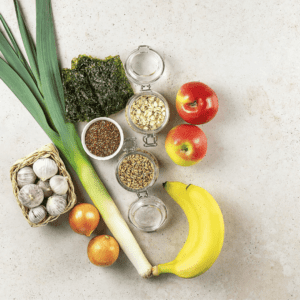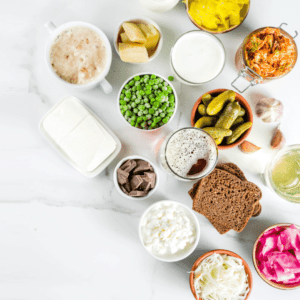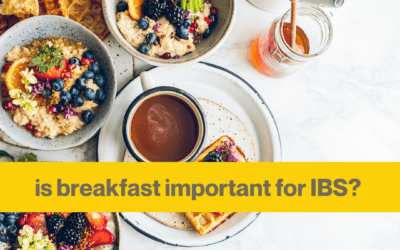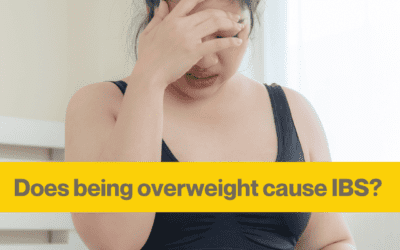If you’ve tried taking prebiotics for your IBS you might have noticed they can really make a big impact. And not always in a good way!
Prebiotics are a type of short chain sugars found in plant foods, and they also help to feed our healthy gut bacteria. Many people with IBS and SIBO have problems with gut bacteria, but it can be tricky to know how to tackle this unless you run a stool test, or SIBO breath test.
I know this can be a confusing area, so let’s take a look at different prebiotics and how they affect our gut.
Prebiotics or probiotics?
Firstly let’s clear up the name prebiotic. Although they sounds similar, prebiotics and probiotics are very different.
- Probiotics are live bacteria which provide a benefit to us when we eat them.
- Prebiotics are the food for these bacteria, usually a type of fibre.
Our gut bacteria ferment the fibre in food that we cannot digest and they help to keep our digestion healthy.

What are prebiotics?
The common prebiotics you might have heard of are
- Fructans – Fructo-oligosaccharides and Inulin
- Galacto-oligosaccharides
- Lactulose
These are short chain and long chain sugars which are found in low levels naturally in plant foods such as asparagus, sugar beet, garlic, chicory, onion, Jerusalem artichoke, wheat, honey, banana, barley, tomato, rye, soybean, human’s and cow’s milk, peas, beans.
Humans don’t break prebiotics down well, so they travel through the digestive system to the large intestine, where they become food for the gut microbes.
When the gut bacteria ‘eat’ the prebiotics they produce something called Short Chain Fatty Acids (SCFAs), which are anti-inflammatory molecules that help the gut. These SCFAs even travel around the body with beneficial effects on our brain and immune system.
The benefits of prebiotics for IBS
The two main reasons for taking prebiotics are
- change the gut bacteria to a more beneficial mix by feeding the good ones
- increase the SCFAs made by bacteria
- lower the gut pH ( a good thing for gut health)
- improve levels of secretary IgA (which encourages a healthy gut lining)
Many people with IBS have lower levels of the group of healthy gut bacteria, Bifidobacteria. This may play a role in your symptoms like bloating, constipation, or excess gas.
Eating prebiotics foods or taking prebiotics may help to change the balance of gut bacteria, which could improve your symptoms.
It really depends on what is causing your IBS. If you have a problem with gut bacteria, then changing the gut bacteria with prebiotics might work.
But if your IBS is caused by slow motility, a parasite infection, or stress then taking a prebiotic might not be as effective.
Research has found some people with IBS do feel better after taking a prebiotic supplement. People had improvements in stool consistency, reduction in bloating and gas, and even improvements in anxiety.
You might get an increase in beneficial bifidobacteria from taking prebiotics but some studies didn’t notice an increase in IBS quality of life, or reduction in symptoms for people who tried taking them.

Watch out for FOS if you have IBS or SIBO
One ingredient to look out for if you have a sensitive stomach is fructo-oligosaccharides (FOS). This is very high in FODMAPS and it has been found to increase excessive gas and bloating for people with SIBO.
It doesn’t mean you definitely can’t take it, but perhaps just notice what your digestion is like when you do try it. This is especially key if you’re going to take a large dose in supplement form.
I had a client who had been taking a large dose of FOS for her IBS after researching it’s benefits on the internet. She had really bad flatulence (and bad smelling) for about a week after taking it.
FOS is added to some supplements marketed for gut health. It is also in onions, garlic, Jerusalem artichokes, leeks and chicory. If you’re someone who gets an IBS flare up after eating onions and garlic, it might not be suitable for you to take a FOS based prebiotic supplement.
How to take a prebiotic for IBS
Here are my tips from working with lots of SIBO positive and IBS clients
- Firstly check you’re ok with high levels of prebiotic foods (see above)
- Next start with a very small dose. My top tip is to open up the capsule and tip half the contents away. This means you’re starting with only 1/2 a capsule at a time.
- Notice your symptoms over the next 24 hours. If you feel are ok with it, increase the dose a little bit each day until you get to the recommended amount.
- The studies into prebiotics for IBS use quite high doses, such as 3-7g per day of FOS or GOS or a mix. They run studies from 6-12 weeks. This means you might not see any improvement at lower doses, or it could take a bit longer.
The reason for starting slowly is that you want to avoid unnecessary IBS flare ups. But also, if you add lots of food for the bacteria, but you’ve got low levels of bifidobacteria, you could overwhelm what is there, causing bloating, diarrhoea or cramps.
What has been your experience with prebiotics? Let me know in the comments below, I’d love to hear how you’ve got on with them.
Work with me - IBS Nutritionist
Book a free call to talk about working with me

IBS Nutritionist
Hi, I'm Anna Mapson, registered Nutritional Therapist.
I help people with IBS and SIBO get control of unpredictable gut symptoms to find long term relief from painful and embarrassing IBS without restrictive dieting.
I can help you to:
- understand your digestion better, so you recognise your triggers
- eat a well balanced diet, with tasty meals that are simple to prepare
- reintroduce your trigger foods so you can get back to enjoying food again
Find more about my 3 month 1:1 Gut Reset programme.
Bile Acid Diarrhoea – A Forgotten Reason For IBS-D?
Struggling with IBS-D? Did you know it could be related to bile acid diarrhoea (BAD)? You might not have heard of this, but some studies show that around 34% of people with Diarrhoea predominant IBS may have bile acid malabsorption. What are bile acids? Bile is made...
Why breakfast is important if you have IBS
Is breakfast the most important meal of the day? Many people I work say they just don’t feel hungry in the morning, and so avoid eating. Maybe you don’t want to start off your bloating that hits as soon as you eat. Or you feel a bit nauseous first thing and want to...
Does being overweight cause IBS?
I'm getting straight to the point with this one - There isn't any evidence that being a heavier weight causes IBS. But, what we eat, and the way food moves through the body can impact our body size, and can also affect digestive symptoms like bloating, gas, diarrhoea...





Do you accept Medicare?
I probably know the answer, but just in case; no harm in asking.
Hi Gloria, I’m based in the UK so I don’t unfortunately.
I think I have its m but have never been. diagnosed. Do you think Biomel Prebiotic & Low FODMAP Fibres will help me.
Hi Judith firstly I’d suggest going to your doctor to get their opinion on your digestion if you’ve never been diagnosed, it’s important that other conditions are ruled out. Whether additional fibres will help or not depends on what your symptoms are and what your diet is like now. I.e. taking extra fibre won’t help if the diet is already high in fibre. If you want to start taking prebiotic fibres go low and slow, start with a small amount and work up to the recommended dose, it can cause bloating and other symptoms otherwise.